
Leadership in the 21st Century Church
Buckle yourselves in for a challenging but extremely refreshing read! Seasoned lovingly with a little bit of salt throughout, Love Dudley’s Adrian Lowe questions the extent to which centralised systems of government and leadership are infiltrating the 21st century church structure.
In preparing to contribute to my local congregation’s Sunday preaching plan where we are looking at the book first book of Samuel, it became clear that the chapter I am speaking on has much to say about leadership amongst many other things!
Let’s take a look together at how 1 Samuel Chapter 8 can speak to us today about leadership.
So, what is the overarching message of this chapter? Largely it’s about ‘government’. It highlights the stark contrast between God’s design and plan for ‘government’, and that which His people aspired to. It may come as no surprise that their view was different to His! The chapter splits into two halves, the first half talking about Israel’s rejection of God’s government and their desire for a framework of leadership that looks more like that of the surrounding nations, and the second half warning of the consequences of abandoning the delegated nature of His government.
In verse 1 we are reminded of the system of government, orchestrated by the Lord that had existed since the people of Israel had been liberated from the tyranny of Pharaoh and that it is uniquely different to that of the surrounding nations. For 400 years since Israel’s return from exile they had been led by Judges, priests and elders who had responsibility, under God’s rule for governing His people – Israel. The bulk of day to day decision making was handled by the tribes of Israel themselves. Although it didn’t always go according plan, as illustrated in the opening verses of this chapter, nevertheless it was always God’s intent that He should be King. For centuries He had shown Himself to be the author and creator of a decentralised system of government where people were valued and engaged and took responsibility for the community in which they lived.
Decentralised government remains His plan – the New Testament bears out this principle. Paul doesn’t appoint elders in every church he plants, simply to follow a well-established Hebraic tradition or historic social organisational pattern. Neither are the five-fold ministry gifts of Ephesians 4 the appointment of a new social hierarchy or a power crazed elite. Apostles, prophets, evangelists, teachers and pastors along with elders are clear examples of the decentralised, distributed government of God for His new community – the church. Our sinful tendency is to create a top down spiritual order of power and control. We imagine apostles must be at the top of the tree and the other gifts are somewhat inferior and sit under the apostle, although nothing could be further from the truth. Ultimately Ephesians 4 describes the ascended Christ taking His rightful place as King over all creation, distributing Himself and His government among His people. There is no ‘head’ or ‘Head Office’’, He is the head and He’s the office!
Interestingly, the prophet Joel predicts that when true power comes it will be distributed in a radically different way. ‘Your sons and your daughters’……. even on ‘servants male and female’. Joel anticipates what actually happened at the birth of the early church in the opening pages of Acts. Being endued with power from on high results in the inversion of existing power hierarchies.
Incidentally, increasingly the business world is moving away from the old hierarchical model of command and control to a more decentralised system of leadership and management. In their brilliant book Starfish and the Spider, Ori Brafman and Rod Beckstrom give us a window on their five years of ground-breaking research. Based on the concept – if you cut the spiders head off it dies; but if you cut off a starfish’s leg it not only grows a new leg but the leg that has been cut off turns into another starfish; the book argues that organisations fall into two categories: traditional ‘spiders’ which have a rigid top-down leadership and the revolutionary ‘starfish’ which rely on the power of peer relationships. It explores what happens when ‘starfish’ organisations take on ‘spider’ organisations. Everyone in leadership should read this book.
The first chapter of Samuel goes on;
4 Finally, all the elders of Israel met at Ramah to discuss the matter with Samuel. 5 “Look,” they told him, “you are now old, and your sons are not like you. Give us a king to judge us like all the other nations have.”
The people approach Samuel initially with a legitimate claim: his sons haven’t led well, had been derailed by greed, and allowed it to pervert their judgement. This becomes an opportunity for them to start to campaign for a different architecture of government. Their plan was to borrow a model of government and leadership from the broader ‘world community’ around them. Other nations had Kings and they didn’t like being distinctively different. They exchanged the unique glory of being the chosen, faithful and obedient people of God for disobedience, choosing a pagan system of government. For the sake of status, power and influence with the surrounding nations, whether at this stage they fully realise it, they rejected not only God’s design for government – a Decentralised System, but they were rejecting Him as their King. They advocated a replacement system, a Centralised System of Government. ‘Give us a king to judge us like all the other nations have’…. It was more important for them to be respected by the ‘world community’ than is was to do the right thing, be obedient, find some new judges and remain engaged in governing their own community.
Samuel’s prophetic voice is ignored and his counsel rejected, so he goes back to the Lord for some guidance (v7-9). The Lord reassures Samuel, “the Lord replied, “for they are rejecting me, not you”. Their desire for a substitute system, a Centralised System of government represented by their desire to appoint a King is a direct rejection of God Himself. Like a good, faithful loving parent, God knows that the best thing to do is to let them have their way and discover the error of their way. They will eventually come to realise that a pagan system of government ends in unmitigated disaster.
Whilst the Lord allows them to pursue a pagan governmental structure it comes with a striking set of warnings all of which are the hallmarks of a rejection of God as King as they demolish the architecture of Decentralised Government and replace it with a pagan idolatrous design, a Centralised Governmental structure. These serve as warnings for us too. They could even be used as a litmus test as to the truth of the architecture of our own leadership structure.
A Centralised Governmental System has the following impact:
1: It creates a need for affirmation and creates a system of gradation
Chariots, charioteers and accompanying runners are all symbols of a prospering status (verse 11). This requisite for status results in a public display of power and influence! One of the most telling outcomes of a ‘King’ (the symbol of a centralised system of leadership and government) is a need to ensure our public profile sharpens our sense of value and worth. Ultimately it’s a quest for affirmation, often motivated by insecurity. Let me give you three examples; Firstly, the temptation to use Twitter, Facebook and Instagram for leaders to make the most of every ministry opportunity, carefully crafting the best possible pose for a ‘selfie’, is a real issue!
Secondly, the talk of creating a culture of honour has grown in popularity – whilst I understand the sentiment – we have to work hard as we attempt to create this culture of honour, that we don’t by default create a culture of deference, homage and even veneration where a small few become a spiritual elite, impervious to feedback and unwilling to share their weaknesses. All of us need people to knock us off our chariots or at least put a stick in the spokes! Who is yours?
Thirdly, the disciples were regularly arguing over who was the most important. As leaders our ego is possibly one of our greatest enemies! Jesus is clear in Luke 22 ‘In this world the Kings and great men lord it over the people…’ In one translation they have a label or a title ‘benefactors’. Notice the system to which Jesus refers? He’s talking about the centralised governmental system (a world of Kings) that by nature predicates ego and the gradation of social structures. Beware of titles and the glamours of publicity that accompany them. Senior Pastor, Executive Pastor, Bishop, etc. Largely these are of a human construct that ultimately speaks of a system that refuses God as King and wants to appoint its own, just like the Israelites. Christ is clear that we share the same name as Him….servant! If there is any rank, the Gospel is clear, it calls us to take a lower rank not a higher one!
Perhaps we could even conclude as illustrated in this verse – the tragedy is that one generation’s obsession with the merry-go-round of a centralised system of government has an impact on the next – the younger generation?
2: It commodifies people
By very nature, the architecture of centralised forms of government means they are self-serving. (v12,13) When we reject God’s government, by default we align ourselves with the world of personal gain and private profit. This is a commodity driven world whose gravitational pull draws us all to be orbiters of its consumer mantra. Acquisition becomes the name of the game. Stuff, in all its myriad of forms becomes our pursuit. We are all engaged in a race for success in some shape or other, whether in our private lives our in ministry. A new form of paganism grips us in the 21st century in the form of commodity and it impacts the way we see people. In this system people are a means to an end – private profit and personal gain! A growing obsession with vision, values, mission statements, brand, marketing and a trendy social media presence are seemingly increasingly being held up to be a strategic route for furthering the growth of the church. Really? Just like the Lord warns Israel, the potential of this pagan bandwagon demands increasing amounts of resource to keep its corporate model roadworthy. It’s all too easy to recognise the demon in the world system but fail to discern the grip that it has on own hearts and the way we lead!
3: It is only interested in the ‘best’ and being the ‘best’.
Samuel warns that only “the best will do” for this centralised system of governmental rule, it will consume prime assets and demand the allegiance of everyone (verse 15,16). This is a system that calls for the cream of the crop. It’s survival is dependent on top-tier people and principal assets. Seemingly the fittest and most thriving congregations are those who are asset rich. I am not talking buildings here but human resource. Our new shape of CEO style leadership that gathers the talented and the skilled seems a far cry from the ragamuffin disciple group that Jesus chose, but you can’t deny it’s success. The quality of what we do and the consequential outcomes are more often than not related to the competence levels that exist in our management and leadership teams. Whilst not wrong, if this is all we have we have, we simply have one well-managed organisation! Surely we have a hunger for more than the sum total of our talent? The story of the government of God is the absolute opposite! It’s a system that among other things empties itself and becomes nothing!
4: It is enslaving by nature
In His kindness the Lord gives His final warning of what happens when you chose a pagan system of government. ‘…you shall become his slaves…’ (Verses 17,18). He teaches them the eternal principle, that every road of disobedience leads to the same place – slavery. Jesus says the same thing, ‘you can’t serve two masters’! The metaphors Jesus uses are uncannily similar to that of the Exodus story, well known to Samuels’s hearers, – mastery and slavery. Mammon, the god of wealth (a consumer based economy), seeks to master humanity and by its very nature is enslaving. This verse makes it clear that it demands our devotion and undivided affection. Jesus calls us to make a choice, to whom shall we swear our allegiance? At which alter will we worship? The god of Commodity or the only true God – Yahweh? These choices; whom shall we serve, whom shall we worship, which god/God will we love remains Christ’s challenge to every generation. Mammon’s mantra calls for our enhanced performance, it demands we work harder and longer and achieve endless productivity gains in order to meet the desire it supplants in our hearts for ‘more’ in all its shapes and forms. How do we know that we are participators in this predatory system? Jesus helps us, He makes it clear that anxiety (a loss of peace), restlessness (an inability to stop) and fear (in all its guises) are just some of the symptoms that are present in the lives of those enslaved by a consumer system.
Either He is King and we are subject to a whole new governmental system and economy or we are under the domination of another kingdom, a pagan governmental system! Israel has known in their past what is was to be part of the commodity driven system of centralised government in the form of Egypt. The tyrannical Pharaonic system of commodity had enslaved their forebears. People existed simply to propel the consumer machinery and satisfy Pharaoh’s obsession for more. All of us in our varying shapes of leadership ministry must take great care not to get caught up in the treadmill of consumerism, even in our churches and ministries. Maybe if you’re anxious, restless and fearful you have unwittingly sold out to a Godless system.
Related posts
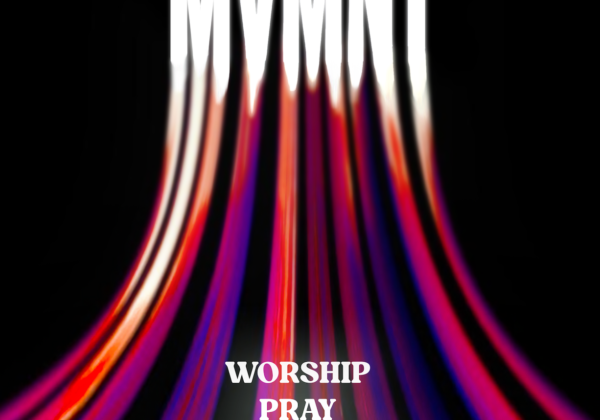 MOVEMENT – Youth Prayer for the Black Country - We’re back! After successfully gathering nearly 200 young people for the Youth Prayer Gathering the last two gatherings, we’re keen to come together again. This is MOVEMENT, named by young people at Together Festival – a moment to worship, pray and gather the young people of our region. Facilitated by Love Black Country and The […]
MOVEMENT – Youth Prayer for the Black Country - We’re back! After successfully gathering nearly 200 young people for the Youth Prayer Gathering the last two gatherings, we’re keen to come together again. This is MOVEMENT, named by young people at Together Festival – a moment to worship, pray and gather the young people of our region. Facilitated by Love Black Country and The […]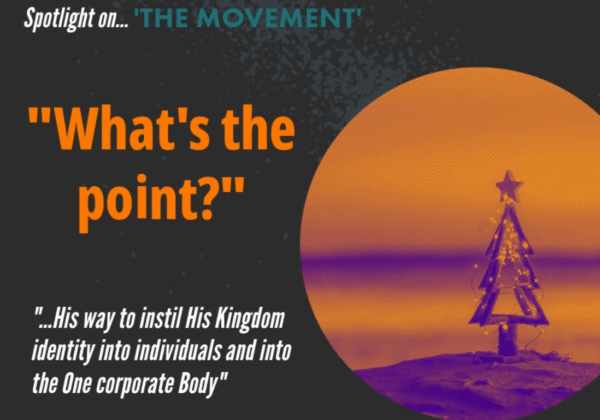 Feasts & Festivals – What’s the Point? - Together Narrative As 2023 draws to a close and the New Year almost upon us, I reflect on the past 12 months and focus on certain highlights that will remain with me for many years. One of these, for a whole variety of reasons, is undoubtedly the Together 23 Festival at Himley on July 8. […]
Feasts & Festivals – What’s the Point? - Together Narrative As 2023 draws to a close and the New Year almost upon us, I reflect on the past 12 months and focus on certain highlights that will remain with me for many years. One of these, for a whole variety of reasons, is undoubtedly the Together 23 Festival at Himley on July 8. […]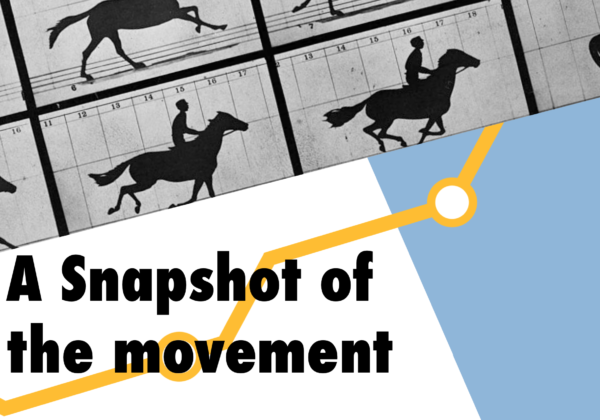 Snapshot – A review of a year of movement. - Snapshot 2023 – Love Black Country As we share this annual snapshot, we want to take a moment to express our gratitude to you all. Love Black Country has been part of this regional Church community for over 30 years, and it’s humbling to see the progress we’ve made together. This movement isn’t just about […]
Snapshot – A review of a year of movement. - Snapshot 2023 – Love Black Country As we share this annual snapshot, we want to take a moment to express our gratitude to you all. Love Black Country has been part of this regional Church community for over 30 years, and it’s humbling to see the progress we’ve made together. This movement isn’t just about […]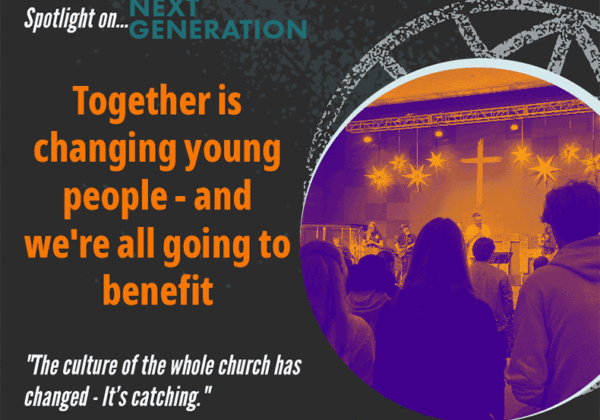 MOVEMENT – How a regional youth gathering changed a church - Last week 200 young people gathered TOGETHER from across the Black Country to worship & pray together, this regional evening was a roaring success with young people pouring themselves out for Jesus and coming forward for prayer. The sense of the spirit was tangible. We’re sure that investing in young people will feed, grow and […]
MOVEMENT – How a regional youth gathering changed a church - Last week 200 young people gathered TOGETHER from across the Black Country to worship & pray together, this regional evening was a roaring success with young people pouring themselves out for Jesus and coming forward for prayer. The sense of the spirit was tangible. We’re sure that investing in young people will feed, grow and […]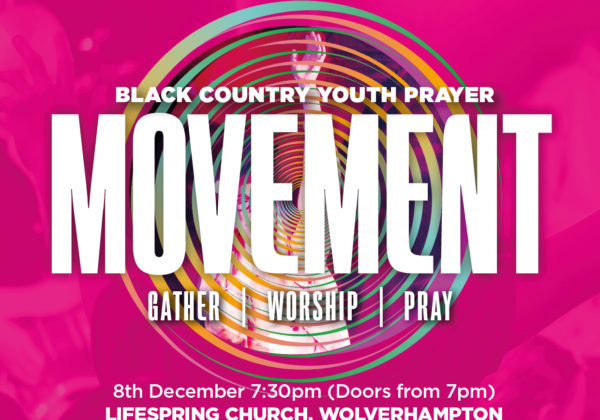 MOVEMENT – Youth Prayer for the Black Country - We’re back! After successfully gathering nearly 200 young people for the Youth Prayer Gathering in April, we’re keen to come together again. This time with a new name, as selected by young people at Together Festival MOVEMENT This is MOVEMENT, named by young people at Together Festival – a moment to worship, pray and gather […]
MOVEMENT – Youth Prayer for the Black Country - We’re back! After successfully gathering nearly 200 young people for the Youth Prayer Gathering in April, we’re keen to come together again. This time with a new name, as selected by young people at Together Festival MOVEMENT This is MOVEMENT, named by young people at Together Festival – a moment to worship, pray and gather […]